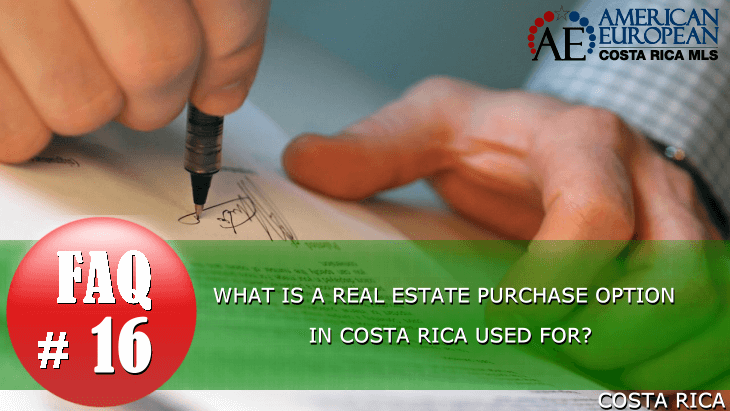What is a real estate purchase option and when is it needed? Who writes up this purchase agreement? What should be in this contract? Is it legally binding?
A real estate purchase option is a contract where the seller gives the buyer the exclusive right to purchase a specific piece of property. The contract stipulates all the details accepted by both parties on the property transaction and make it legally binding.
The language
The official language in Costa Rica is Spanish. But, the legal document doesn’t necessarily have to be in Spanish. Attorney Henry Lang has a perfect explanation about the language to be used in transactions in Costa Rica. It is very important that you use a bilingual notary public if you don’t have enough knowledge of the Spanish language.
Legally binding
To make a real estate purchase option in Costa Rica legally binding, it’s recommended that a notary public writes up the agreement. That’s mainly because there will be earnest money involved, to make the agreement is legally binding. The notary public can include the necessary text for any of the parties to present the document to the National Registry to make it legally binding (when the other party doesn’t comply with what’s promised)
Different names
A real estate purchase option can have many different names, depending on the language and who writes it up:
In English
- Sales agreement
- Option to purchase sale agreement
- Buy Sell agreement
- Property purchase agreement
- Reciprocal promise to buy and sell
- Letter of intent
In Spanish
- Opción de compra venta de inmueble
- Opción de Compraventa
- Contrato de Promesa Recíproca de Compraventa
- Contrato de compra venta inmuebles
The Content
- A real estate purchase option in Costa Rica usually carries the following content:
- Names and legal information of the seller and the buyer
- Legal Description of the Property and object of the Promise
- The Property Survey Map
- The Reciprocal Promise (what do they promise)
The Sales Price
- Earnest Money Deposit and Payment Schedule – how much, where and when
- Earnest Money Escrow Agreement – who gets what if there is a problem
- Liens and Encumbrances – making sure there are none, or what to do when there are any
- Property Survey – this allows the buyer to hire a surveyor to check property lines
- Home Inspection – this allows the buyer to hire a home inspection, specific details
- Risk of Loss or Damage – who is responsible for the property until closing
- Property Taxes and Utilities – which documents should be provided by the seller at closing
- Real Estate Commission – who pays the real estate commission and when
- Closing Costs – who pays what
- Arbitration Agreement – this describes what happens in case of a disagreement before closing
- Contractual Address for the Parties – where can parties be notified
- Public Instrument and Translation – this describes what happens in case the agreement is written in another language than Spanish
My recommendation
Before you sign a real estate purchase option in Costa Rica, get professional advice from someone who represents YOU.
We do appreciate your real estate referrals. If/when you purchase property in Costa Rica, we’d like to assist.
We are the real estate experts, from coast to coast. Contact us now.


















